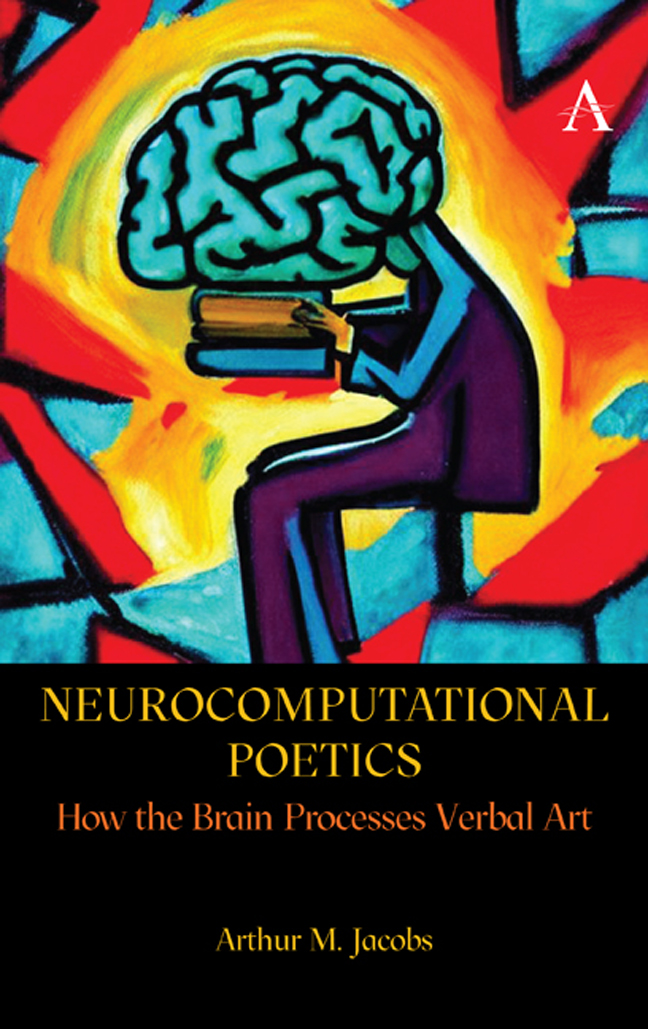Book contents
- Frontmatter
- Contents
- Acknowledgements
- Dedication
- Preface
- 1 Introduction: The Two Boons of an Unnatural Daily Activity
- 2 Models and Methods
- 3 Text Analysis
- 4 Reader and Reading Act Analysis
- 5 Computational Poetics I: Simple Applications
- 6 Computational Poetics II: Sophisticated Applications
- 7 Neurocomputational Poetics I: Upper Route Studies
- 8 Neurocomputational Poetics II: Lower Route Studies
- 9 Conclusions
- References
- Index
7 - Neurocomputational Poetics I: Upper Route Studies
Published online by Cambridge University Press: 01 March 2024
- Frontmatter
- Contents
- Acknowledgements
- Dedication
- Preface
- 1 Introduction: The Two Boons of an Unnatural Daily Activity
- 2 Models and Methods
- 3 Text Analysis
- 4 Reader and Reading Act Analysis
- 5 Computational Poetics I: Simple Applications
- 6 Computational Poetics II: Sophisticated Applications
- 7 Neurocomputational Poetics I: Upper Route Studies
- 8 Neurocomputational Poetics II: Lower Route Studies
- 9 Conclusions
- References
- Index
Summary
Having dedicated two chapters to the discussion of methods of computational poetics able to predict behavioural aspects of the reading act such as liking ratings or line choice, I now turn to Neurocomputational Poetics studies. In these, I combine computational with experiential, behavioural and neuronal analyses that inform about the validity of the NCPM 's hypotheses and predictions regarding reading acts for diverse materials from single words to multiword expressions, stories and poems.
The central hypothesis of the NCPM mesomodel discussed in Chapter 2 with regard to the upper route is this: texts that have clearly more background than foreground elements likely trigger immersive experiences through activation of the brain's automatic reading network and implicit processing leading to a fluent reading mode. In contrast, those with a low background/foreground elements ratio tend to evoke an aesthetic trajectory associated with the operation of larger neural network including more right-hemispheric regions and explicit processing resulting in a dysfluent reading mode, that is, they activate the lower route. Empirical studies can test this hypothesis by finding traces of the operation of the upper and lower routes assumed by the NCPM at the three levels of observation: the neuronal, experiential and behavioural. Chapters 7 and 8 discuss key studies that examined the NCPM's central and other key hypotheses over the last decade. The upper route studies of Chapter 7 deal with the reading of prose and mainly examine the first boon of reading, immersive processes. The lower route studies presented in the next chapter focus on the second boon, aesthetic processes, mostly examined in poetry reception.
A short recap concerning the other main assumptions of the NCPM seems in order here before we consider the empirical evidence. In the introductory Chapter 1, I discussed the likely neuronal bases of immersion expressed in the symbol grounding and neuronal recycling hypotheses. In short, the first hypoth-esis claims that the neuronal processes evoked by words and sentences are similar to those evoked by the objects they refer to. The second postulates that ‘exapted’ structures in the brain, like the visual word form area, enabled efficient reading and the countless fast inferential and figurative processes ‘running’ in other brain regions that underlie it. The neuronal recycling hypothesis is tightly linked with what I called the Panksepp–Jakobson hypothesis in honour of these two pioneers whose work inspired mine so much.
Information
- Type
- Chapter
- Information
- Neurocomputational PoeticsHow the Brain Processes Verbal Art, pp. 175 - 190Publisher: Anthem PressPrint publication year: 2023
